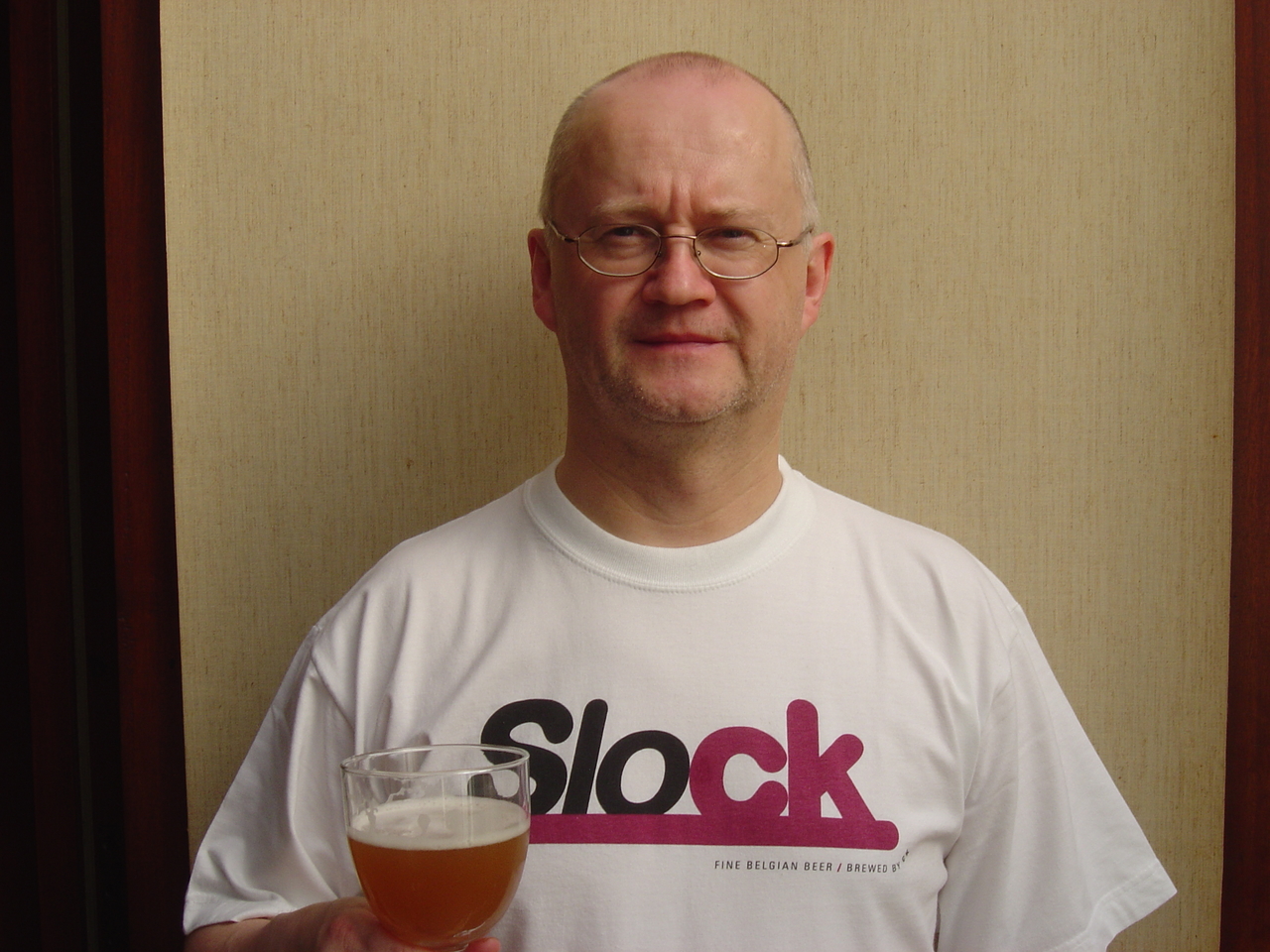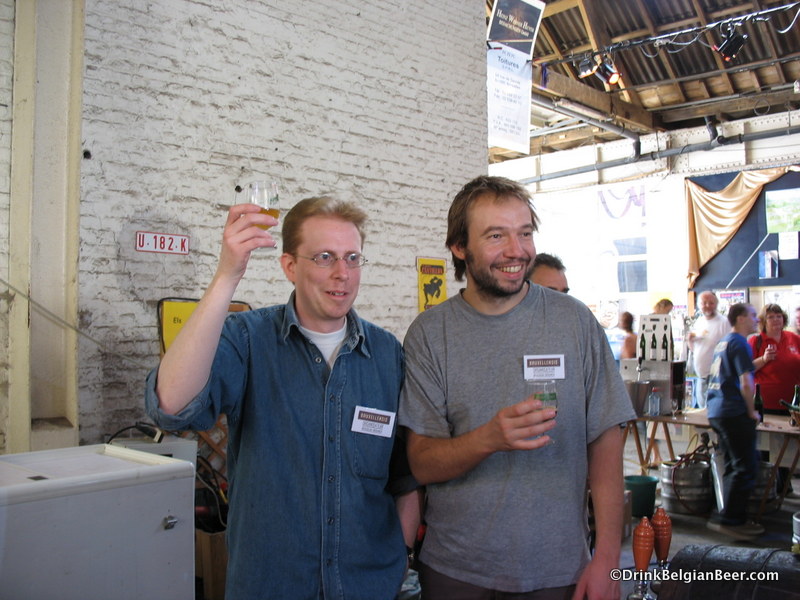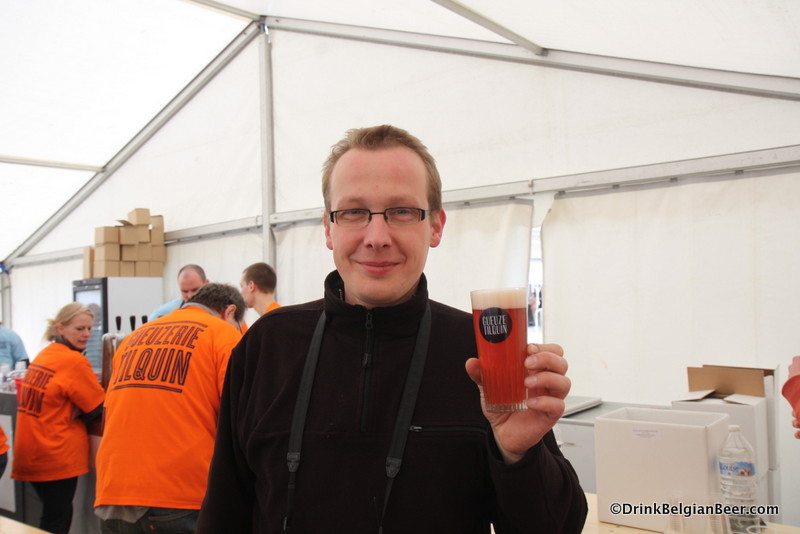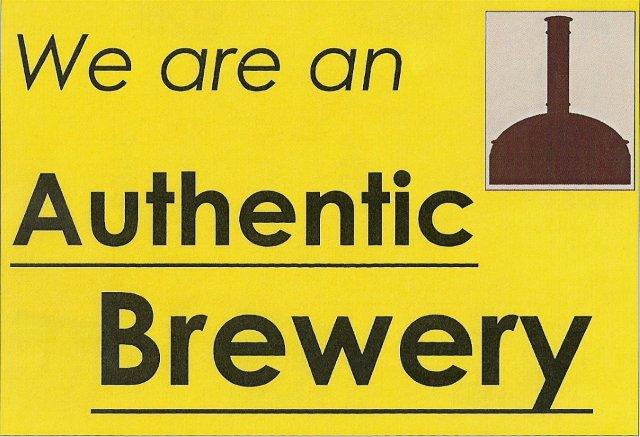This is a guest post by Carl Kins. Carl is very well known in beer circles in his native Belgium, as well as all over Europe and the U.S.A. He is a member of Zythos, The European Beer Consumer’s Union (E.B.C.U.) and other beer associations and groups. He is an International Beer Judge, and has judged at the Brussels Beer Challenge, The Craft Brewer’s Conference, The Great American Beer Festival, Birra dell’ Anno, the International Beer Challenge, and Villaggio Della Birra. Carl has written for such publications as Ale Street News, Beer Connoisseur Magazine, and De Zytholoog. He makes Kortrijk, West Flanders, his home. Carl’s first piece for DrinkBelgianBeer.com was here, on the subject of Brut beers.

(Disclaimer from DrinkBelgianBeer.com: the information, opinions, and views expressed in this article are those of Carl Kins, and are not necessarily shared by, or endorsed by, this website, or its owner.)
The Belgian brewery, fifty shades of grey
Who really makes that great liquid, pouring out of bottle or keg? And if the content in your glass is tasty, who cares? Well, you should.
There are about 170 active beer producing brewery facilities in Belgium (give or take). But if you look around, you will think there are much more. The reason is that there are many companies out there that conceive one (or more) beer recipe(s), market and sell the beer(s), without having any brewing equipment. They are “commissioners” and order the beer to be produced in someone else’s brewery and thus can be called “beer firms” or “beer companies”. All this is not really new, neither in Belgium nor elsewhere.
At times, certain brewers and consumers revolt against this approach. This was also recently the case with a number of small “artisanal” brewers like Brasserie de la Senne, Tilquin, De Dolle Brouwers, Jandrain-Jandrenouille, Cazeau, Brunehaut, Blaugies, etc.

The inducement was an article, in a new magazine, called Belgian Beer and Food, written by Joe Stange, a good friend of the smaller brewers. He wanted the opinion on the subject and asked around. This article triggered a new action by the mentioned artisan brewers, stating the oft repeated arguments, such as: these so-called breweries consist of people who are not brewers, they are marketing oriented, not beer oriented, etc. Further arguments are that these beer firms take away shop space and export opportunities, do not have to make investments and thus take big risks, etc. All these reasons are mostly true, and I can follow them.

But they also use arguments that do not convince me, e.g.
• These beer firms trample upon the very notion of brewing art, because there is no need to be a brewer in the traditional sense. However, in this, they forget the brewer who brews for the beer firm has this art and skill, and most of the times there is a clear synergy.
• These non-entrepreneurs do not have to pay when a brew goes wrong, leading to unfair competition in relation to authentic brewers. However, also the brewery that brews for the beer firm has to make money, and so, in a lot of cases the risk is and remains with the beer firm.
• This leads to a gradual standardization of the taste of Belgian beer, as the “footprint” of the breweries producing the beer firm beers will necessarily be perceived in all, leading to uniformity. First of all, there are quite a few breweries that do this, the most famous being De Proefbrouwerij, Brouwerij Anders, De Graal, Du Bocq, Gulden Spoor, etc. all having their own footprint. Moreover, every one of them use different yeasts either from their own yeast bank or from international yeast banks, and/or use unusual hops, herbs and spices (e.g. Captain Cooker with “manuka”, …) giving a distinct character to each beer.
In their effort, they also ask the beer consumers unions to tackle the issue. And this is exactly what Zythos, the Belgian arm of the European Beer Consumers Union did. They formulated a nuanced standpoint, stating that not all beer firms are equal. Here is their standpoint, to which I added some personal comments to each argument, supporting the ideas:
• “There clearly are beer firms that limit themselves to selling the beer while they have little input into the making of it. Plenty of them are marketers or salespeople with a good idea for either a name, a glass shape, etc. and with no brewing experience, but with huge enthusiasm about beer. Others are sports or other clubs who want an original way of making a quick buck by doing something popular, “beer”.
• But there are others that actively contribute to the finalization of the recipe. Think of beer tasting or historical societies trying to revive old recipes (Aarschotse Bruine, Seef, …), etc.
• And there are even beer firms that brew themselves in another brewery’s equipment (at their start De Ranke at Deca ; recent examples include De Struise Brouwers brewing at Deca, and Brouwers Verzet brewing sometimes at De Ranke and Gulden Spoor).
• Furthermore, in recent years some of these beer companies have grown into a full-fledged brewery, which may not have been possible without this intermediate step (De La Senne, De Ranke, Dilewyns, and within a few months Belgoo Beer).
• It also allowed some brewers to continue the business, awaiting sufficient money for finalising investments (Kerkom).
• And finally, some official/large-r breweries do not necessarily brew all the beer themselves but outsource it to some of their peers (Bosteels and St-Feuillien for ages but now no longer, St Canarus, Ter Dolen, …)”.
All in all, it shows there are different “colour shades”, such that that consumers often feel lost and need clear and accurate information”.
Where brewers and consumers completely meet is on two important topics.
“Transparency” about who has really brewed the beer. The aim should be to know not only what company brewed it, but also where the warm kettles (street, city, country) are. This would ensure the consumer knows what he gets, independent of whether it’s a real brewery or a brewery firm. Indeed, if that were implemented, by looking at the label a drinker would know that Lierse Caves is brewed by Verhaeghe in Vichte, and that the new abbey beer Averbode is brewed by Huyghe, etc.
For the artisanal Belgian brewers, an additional concern of theirs is the “Made in Belgium” label, whereby they foresee a degradation as it will not take long before imposters start up a beer firm in Belgium and have their beer brewed in the Netherlands, Luxembourg, etc.
The second one is the use of the word “brewery”. All agree that the term should only be used by those manufacturing and selling beer which have brewed entirely in their own brewing equipment. And here lies the problem. Anyone can put beer on the market and claim they are a brewer. And this is exactly what happens. Indeed, a number of beer companies do call themselves breweries, although they are not, strictly speaking. An example of this is Broeder Jacob, which mentions “Brewery Brother Jacob” in Wezemaal, whereas the beer is produced in Du Bocq, Wallonia. In Wezemaal, there is nothing. That is not only deceptive to consumers, but also an insult to centuries of tradition, culture and know-how, as the artisanal brewers rightly put it.
Brewers and consumers also found one another at beer festivals, where a lot of beers are poured. There, it is not so easy to make a distinction either, because most beers are sold on draft, such that the punters cannot look at the label. So, either they check social beer media (untappd, ratebeer, beer advocate, …) for finding out, or there should be another way. And an alternative was launched for the first time by Chris Bauweraerts from Achouffe fame at the 2006 Zythos Beer Festival with signs, reading “we are an authentic brewery”, handing them out to the people who really have brewing equipment. This was well perceived, and thus the initiative was repeated at this year’s ZBF edition.
I am glad all this was stirred up again. Personally, I consider the solution lies in good labeling laws, and for this there is a perfect opportunity arising because the European law on labeling for alcoholic drinks has to be reviewed by mid December 2014. All European beer lovers should voice their concern to their national European Parliament members about this in the hope of seeing improvements, not only for Belgian but also for Italian, Spanish, etc. artisanal brewers.

When I contacted Chris Bauweraerts for this article, he referred me to Johan Brandt, owner-brewer from ‘t Smisje, who could provide me with first hand experience.
During our discussion, Johan emphasized a number of important topics.

The first and main one is the fact that breweries and beer companies fight with unequal arms. Indeed, beer companies have little risk, and limited investment, as they do not have to buy (and finance) equipment. Compare this to a real brewery. Johan has been brewing for over 20 years and any money made from brewing has continually been invested back in the brewery, for improving capacity and quality.
Secondly, beer companies take away commercial opportunities from real artisan breweries. Most Belgian pubs are tied to a large brewery, and cannot serve beer from smaller producers. So, these smaller breweries have only two options, i.e. selling through the retail shops and through export. In both cases, the beer companies are steadily eating away a chunk of the market. In certain cases, beer company beers already constitute up to 50 % of the shelf space in retail shops, to the detriment of the artisan breweries. In export, every importer is on the look-out for the new kid on the block, and sign anyone with a beer portfolio, independent of whether it is coming from a real brewery or not. Again, this takes away sales opportunities for the artisan breweries.
Another major factor is the provided information. Most beer companies do not tell where they have their beers brewed, and some do even dare present themselves as a real brewery, although they are clearly not. This is clear consumer bamboozlement, and should be stopped. That is why Johan also supports the idea of mentioning the actual brewery and the place of the warm kettles on the label.

Johan also scolded the beer companies, who now can no longer hide behind the problems artisan breweries had in the past in the start-up phase. Indeed, twenty –thirty years ago, a starting brewer had problems of getting anything, from material to ingredients, as all was aimed at the larger breweries. Now, anyone can get anything in whatever quantity and quality. So, someone with a passion for beer can start his own brewery, without too much hassle. However, Johan despises the spoof of the brewing kit approach, whereby someone buys small equipment (and a book of recipes) and states he is a brewer.
Finally, Johan definitely considers the beer firms to be undermining the credibility of the Belgian beer sector by painting an incorrect picture of reality and making erroneous statements about provenance (regional produce, not produced in that region, …), history, etc.
The advice Johan is giving anyone is one that I fully subscribe to: always check as much as possible any information that you can find about a beer/brewery before purchasing the beer, such that you are fully aware whether your money goes to a real brewer or a beer marketeer. Cheers.
Articles referenced:
http://www.lesoir.be/535112/article/debats/cartes-blanches/2014-05-03/cri-d-alarme-des-brasseurs-belges-artisanaux
http://www.hln.be/regio/nieuws-uit-halle/-bierfirma-s-bedriegen-consument-a1881083/


Leave a Reply